2009 structural changes to local government in England

Structural changes to local government in England were effected on 1 April 2009, whereby a number of new unitary authorities were created in parts of the country which previously operated a 'two-tier' system of counties and districts. In five shire counties the functions of the county and district councils were combined into a single authority; and in two counties the powers of the county council were absorbed into a significantly reduced number of districts.
Elections to the new authorities took place on 1 May 2008 for some of the new authorities, which took up their powers on 1 April 2009. The other new authorities retained the existing county council as the "continuing authority" as of 1 April 2009 with elections taking place two months later on 4 June 2009.
Background
Following the passing of the Local Government Act 1992, the Local Government Commission for England recommended a number of unitary authorities to be created in England during the 1990s. The changes that were implemented meant that much of the country continued to have a two-tier arrangement of local government.[1] Further proposals for unitary authorities in northern England, tied to the option of regional devolution, were put to a referendum in 2004 and were rejected. In 2006, the white paper Strong and Prosperous Communities invited local authorities in England to submit their own consensus-based proposals for unitary authority arrangements, to be submitted before 25 January 2007. Selected submissions went to a public consultation from March until June, with successful proposals announced in July. Legislative requirements for implementation were in place following the enactment of the Local Government and Public Involvement in Health Act 2007.
Proposed changes
Early responses
Various local councils indicated they wish to seek unitary authority status. Four medium-sized towns and historic county boroughs, overlooked by the 1990s review: Ipswich, Oxford, Norwich and Exeter[2] proposed unitary status on their present boundaries, and commissioned a report jointly to press their case.[3] Norwich announced its intention to respond to the invitation,[4] as did Ipswich and Exeter.[5][6] In Lancashire, Preston and South Ribble desired to form a single unitary authority although Preston bid for it alone.[7][8] The City of Lancaster considered seeking unitary status on its present boundaries (having supported a merger with South Lakeland and Barrow-in-Furness to form a Morecambe Bay unitary authority during the referendums review).[9] Blackpool advocated a merger with the Fylde and Wyre districts, which they did not support.[10] Pendle and Burnley also tried to form a unitary authority with Rossendale; however Rossendale rejected this.
The Local Government Chronicle suggested that the non-metropolitan counties of Cornwall, Shropshire, Durham, Cumbria and Northumberland would fit the government's criteria, and that the government would be unlikely to favour carving out unitary authorities from existing two-tier counties.[11] Shropshire County Council, as well as two of the five districts of Shropshire, stated their wish for a move to unitary status.[12][13] The issue was considered in Durham and Cumbria[14][15] and the idea of a North Cumbria authority covering the Eden, Copeland, Carlisle and Allerdale districts had some support.[16] The issue was also considered in Northumberland, with the county council in favour of one Northumberland unitary authority. Alan Beith, the MP for Berwick at the far north of Northumberland, suggested instead a three unitary solution, with authorities for the largely rural north and south-west, and an authority for the urban south-east (Wansbeck and Blyth Valley).[17]
Consultation period
On 26 January 2007, the government confirmed that 26 proposals for unitary authorities had been received.[18] Various county councils proposed they should become unitary authorities: Bedfordshire, Cheshire, Cornwall, Cumbria, Durham, North Yorkshire, Northumberland, Shropshire, Somerset and Wiltshire. Districts seeking to become unitary authorities on their own were Bedford, Exeter, Ipswich, Lancaster, Oxford, Preston. Pendle and Burnley proposed merging as a unitary authority. On 27 March 2007, the government announced that the proposals by Bedfordshire, Bedford, Cornwall, Cheshire, Cumbria, Durham, Exeter, Ipswich, North Yorkshire, Norwich, Shropshire, Somerset and Wiltshire to become unitary authorities would go into the next phase, as would the proposal of Chester for a two-unitary authority Cheshire and by the districts of Northumberland for a two-unitary Northumberland.[19]
On 25 July 2007 it was announced that the unitary proposals by Cumbria, North Yorkshire and Somerset[20] had been rejected.[21] On 5 December 2007 it was explained that the unitary proposals by Exeter, and Ipswich, like those of Norwich (which were referred for review on 25 July 2007) did not meet the requirements to proceed; but may be reconsidered after the Boundary Committee has conducted a review of local government structures across the whole of the two-tier counties they are currently a part of.
A legal challenge was made by Shrewsbury and Atcham Borough Council and by Congleton Borough Council to the government's decisions, on the basis (amongst other things) that the reviews were made without statutory authority. The High Court and then on 4 March 2008 the Court of Appeal rejected the challenge, finding that the review had been legalized retrospectively.[22]
| Region | Proposed by | Proposal | Result |
|---|---|---|---|
| East | Bedfordshire County Council | single unitary authority | |
| Bedford Borough Council | unitary authority with existing boundaries | ||
| Mid Bedfordshire District Council South Bedfordshire District Council | unitary Central Bedfordshire | ||
| Ipswich Borough Council | unitary authority with existing boundaries | Referred to Boundary Committee who decided in February 2010 that while there was support for a unitary structure in Suffolk there were divergent views on what that structure should be. Accordingly, they sugggested the establishment of "a countywide constitutional convention to reach a consensus on a unitary solution."[23][24] | |
| Norwich City Council | unitary authority with existing boundaries | Referred to Boundary Committee.[23] In February 2010 it was announced that Norwich was to become a unitary authority in April 2011, subject to the approval of Parliament.[24] | |
| East Midlands | no bids | ||
| London | not affected by the review | ||
| North East | Durham County Council | single unitary authority | |
| Northumberland County Council | single unitary authority | ||
| Northumberland districts | two unitary authorities | | |
| North West | Cheshire County Council | single unitary authority | |
| Chester City Council | two unitary authorities: Cheshire West and Chester and Cheshire East[25] | ||
| Cumbria County Council | single unitary authority | | |
| South East | no bids | ||
| South West | Cornwall County Council | single unitary authority, Cornwall Council | |
| Exeter City Council | unitary authority with existing boundaries | Referred to Boundary Committee.[23] In February 2010 it was announced that Exeter was to become a unitary authority in April 2011, subject to the approval of Parliament.[24] | |
| Somerset County Council | single unitary authority | | |
| Wiltshire County Council | single unitary authority | ||
| Yorkshire and the Humber | North Yorkshire County Council | single unitary authority | |
| West Midlands | Shropshire County Council | single unitary authority | |
† - in the context of examining options for unitary arrangements in the wider county area.
‡ - the Boundary Committee is asked to advise whether an alternative unitary proposal for Norwich based on revised council boundaries could deliver the required improvements.
Successful proposals
On 27 March 2007 Local Government Minister Phil Woolas announced that 16 councils bidding for unitary status had been shortlisted to go forward for public consultation.[26] On 25 July 2007 Woolas' successor John Healey announced that nine proposals would proceed, subject to the approval of Parliament in the Local Government and Public Involvement in Health Act 2007.[27] A further announcement on 5 December indicated that only the five county level proposals (Cornwall, Durham, Northumberland, Shropshire, and Wiltshire) would proceed, while further consideration was to be given to the various proposals submitted for two more county areas (Bedfordshire and Cheshire).[28] On 18 December it was confirmed that the two-authority plan for Cheshire would proceed.[29] On 6 March 2008 it was confirmed that proposals for Bedford Borough Council to become a unitary authority on its existing boundaries, and for Mid Bedfordshire District Council and South Bedfordshire District Council to merge to create a new Central Bedfordshire authority would be implemented.
Single authorities
In the following areas, the existing non-metropolitan county has now also become a non-metropolitan district (i.e. a "unitary county") and the existing non-metropolitan districts have been abolished.
| Ceremonial county | Non-metropolitan districts abolished in 2009 |
New unitary authority from 2009 |
Existing unitary authorities from 1990s reforms |
Map |
|---|---|---|---|---|
| Cornwall | Penwith Kerrier Carrick Restormel (Borough) Caradon North Cornwall |
Cornwall | Isles of Scilly † | 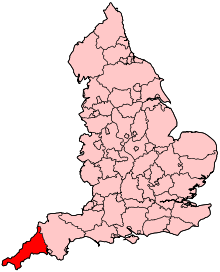 |
| Durham | Durham (City) Easington Sedgefield (Borough) Teesdale Wear Valley Derwentside Chester-le-Street |
Durham | Hartlepool Darlington Stockton-on-Tees (part) |
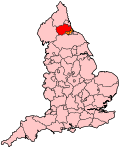 |
| Northumberland | Blyth Valley (Borough) Wansbeck Castle Morpeth (Borough) Tynedale Alnwick Berwick-upon-Tweed (Borough) |
Northumberland | none | 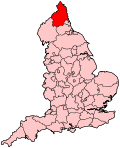 |
| Shropshire | North Shropshire Oswestry (Borough) Shrewsbury and Atcham (Borough) South Shropshire Bridgnorth |
Shropshire | Telford and Wrekin | 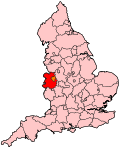 |
| Wiltshire | Salisbury West Wiltshire Kennet North Wiltshire |
Wiltshire | Swindon | 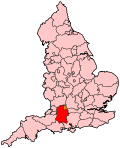 |
† sui generis unitary authority since 1890
Multiple authorities
In the following areas, the existing non-metropolitan counties have been abolished. Each of the two new non-metropolitan districts in Cheshire (resulting from amalgamations of the existing districts) is now also a non-metropolitan county. In Bedfordshire, the new Central Bedfordshire non-metropolitan district (resulting from the amalgamation of two existing districts) is now also a non-metropolitan county, and the previous Bedford non-metropolitan district is now a unitary council.
| Ceremonial county | Non-metropolitan districts abolished in 2009 |
New unitary authorities from 2009 |
Existing unitary authorities from 1990s reforms |
Map |
|---|---|---|---|---|
| Bedfordshire | Mid Bedfordshire South Bedfordshire |
1. Bedford ‡ 2. Central Bedfordshire |
3. Luton |  |
| Cheshire | Ellesmere Port and Neston (Borough) Chester (District and City) Crewe and Nantwich (Borough) Congleton (Borough) Macclesfield (Borough) Vale Royal (Borough) |
1. Cheshire West and Chester[30][31] 2. Cheshire East |
3. Warrington 4. Halton |
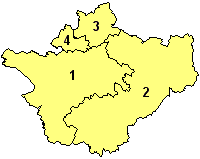 |
‡ existing district
Further changes
The Boundary Committee for England has completed its structural reviews for Norfolk, Suffolk and Devon.[32]
Initial draft proposals were published in July 2008. The committee was expected to make final recommendations by 31 December 2008, but these were delayed, due to legal challenges;[33] and because they didn't assess the potential new authorities in proposals which would have split up the counties between two or more unitaries in aggregate. As a result, a further set of draft proposals were published in March 2009:
Draft proposals for Devon
The further draft recommendations propose two unitary options:
- A Devon unitary authority comprising the existing county of Devon, with no changes to Plymouth and Torbay.
- An Exeter and Exmouth unitary authority, and a unitary authority covering the remainder of Devon, with no changes to Plymouth and Torbay.[34]
Draft proposals for Norfolk
The further draft recommendations propose two unitary options:
- A single Norfolk unitary authority comprising the existing county of Norfolk.
- A two authority structure with greater Norwich unitary authority and a rural Norfolk unitary authority for the rest of the county.[35]
Draft proposals for Suffolk
The further draft recommendations propose two unitary options:
- A single Suffolk unitary authority comprising the existing county of Suffolk.
- A two authority structure with a North Haven [36] unitary authority consisting of Ipswich and Felixstowe, and a rural Suffolk unitary authority for the rest of the county.[37]
Final recommendations
Final recommendations were then due in July 2009.;[38] but a successful legal challenge from three District Councils in Suffolk wanting a three unitary model for Suffolk to be considered by the committee resulted in a further delay. The Boundary Committee appealed this decision in favour of Forest Heath, St Edmundsbury & Waveney Councils in October 2009; in December (2009) they found out their appeal had been successful.
The Boundary Committee has now submitted its final recommendations to the Secretary of State. In all three counties the committee has stated that its preferred option is for a countywide unitary covering the whole of the existing two-tier area to be implemented. In addition in relation to Suffolk they have stated they have no major reservations about the two unitary pattern of North Haven & Rural Suffolk being adopted.[39] Interested parties had until 19 January 2010 to make their representations to the Secretary of State.[38]
Decision on reform
On 10 February 2010, Rosie Winterton, Minister of State for Local Government, announced the proposed final decisions on the unitary proposals:[24]
- Norwich to become a unitary authority, the remainder of Norfolk to retain two-tier structure due to lack of support for change.[24]
- Exeter to become a unitary authority, the remainder of Devon to retain two-tier structure, again due to lack of support locally. The boundaries of Exeter are to remain unchanged.[40]
- Suffolk to be divided into unitary authority areas, the boundaries of which will be decided by a countywide convention.[24]
The changes in Devon/Exeter and Norfolk/Norwich were to come into effect in April 2011, subject to judicial review. Draft structural changes orders were approved by the House of Lords on 22 March 2010,[41] though the Lords took the unusual step of formally noting its regret.[42] The amendments did not alter the draft orders or affect the legal validity of the Lords approval. The House of Commons approved the draft orders on 23 March.[43] The final Exeter and Norwich orders were made on 24 March following a Government statement responding to the Lords vote.[44] However, the orders were quashed in a judicial review[45] causing elections to be held in Exeter and Norwich in September 2010.[46]
Cancellation of further structural changes
The Queen's Speech at the May 2010 State Opening of Parliament included a Local Government Bill to revoke structural change orders that would have established Exeter and Norwich as unitary authorities and prevent the implementation of the Suffolk unitary proposals.[47] The bill was introduced in the House of Lords on 27 May 2010.[48]
See also
References
- ↑ Sancton, A., Merger Mania: The Assault on Local Government, (2000)
- ↑ "Council Submits Unitary Case To Minister". Exeter City Council. 2006-05-09. Archived from the original on 12 December 2007. Retrieved 29 December 2007.
- ↑ "Four Councils Unite In Bid For Unitary Status" (DOC). Exeter City Council. 2006-05-09. Retrieved 29 December 2007.
- ↑ "City welcomes new council plans". Norwich Evening News. 2006-10-26. Retrieved 29 December 2007.
- ↑ "Ipswich's solo bid sparks council wars". East Anglia Daily Times. 2006-10-27. Retrieved 29 December 2007.
- ↑ "£14 m cost' of city independence". BBC News. 2006-10-27. Retrieved 29 December 2007.
- ↑ "Preston and South Ribble bid for the future". Preston City Council. 2006-09-01. Archived from the original on 7 February 2008. Retrieved 29 December 2007.
- ↑ "Councils to support joint venture". BBC News. 2006-09-01. Retrieved 29 December 2007.
- ↑ "Lancaster City Council welcomes Local Government White Paper". Lancaster City Council. 2006-10-26. Retrieved 29 December 2007.
- ↑ "Councillors' snub for 'City of the Fylde' bid". Blackpool Today. 2006-11-14. Archived from the original on 12 December 2007. Retrieved 29 December 2007.
- ↑ "Only five may get unitary go-ahead". Local Government Chronicle. 2006-10-11. Archived from the original on 26 January 2008. Retrieved 29 December 2007.
- ↑ "One Council for Shropshire". Shropshire County Council. 2006-11-11. Retrieved 29 December 2007.
- ↑ "Councillors backing unitary body". Shropshire Star. 2006-11-18. Archived from the original on 27 January 2008. Retrieved 29 December 2007.
- ↑ "White Paper paves way for councils shake-up". The Northern Echo. 2006-10-27. Archived from the original on 12 December 2007. Retrieved 29 December 2007.
- ↑ "Cumbria needs a unity of purpose". The Cumberland News. 2006-10-27. Archived from the original on 12 December 2007. Retrieved 29 December 2007.
- ↑ "MP backs council merger idea". Times & Star. 2001-10-30. Retrieved 29 December 2007.
- ↑ "Leader voices fears for residents with shake-up". Berwick Today. 2006-11-02. Archived from the original on 3 February 2008. Retrieved 29 December 2007.
- ↑ "Twenty-six councils bid to become unitary authorities". 24dash.com. 2007-01-26. Archived from the original on 24 December 2007. Retrieved 29 December 2007.
- ↑ "Woolas announces sixteen successful bids for unitary status to improve local services". 2007-03-27. Archived from the original on 27 December 2007. Retrieved 29 December 2007.
- ↑ Worst Unitary Fears Confirmed (from The Wiltshire Gazette and Herald)
- ↑ Shrewsbury and Atcham BC and another v Secretary of State for Communities and Local Government; [2008] EWCA Civ 148
- 1 2 3 Boundary Committee for England - Structural reviews
- 1 2 3 4 5 6 "Unitary authorities — Exeter and Norwich get green light; Suffolk to decide locally; no change for Norfolk and Devon". Newsroom. Communities and Local Government. 10 February 2010. Retrieved 9 February 2010.
- ↑ Chester City Council - People & Places Archived December 18, 2007, at the Wayback Machine.
- ↑ Communities and Local Government - Woolas announces sixteen successful bids for unitary status to improve local services. 27 March 2007.
- ↑ Communities and Local Government - Healey announces nine successful unitary proposals. 25 July 2007.
- ↑ Communities and Local Government - Green light for five flagship Unitary Councils. 5 Dec 2007.
- ↑ Communities and Local Government - Two flagship unitary Cheshire councils to proceed Archived February 28, 2008, at the Wayback Machine.. 18 Dec 2007.
- ↑ BBC News, 25 July 2007 - County split into two authorities. Retrieval Date: 25 July 2007.
- ↑ Macclesfield borough council press release 25 July 2007. Archived January 12, 2008, at the Wayback Machine. Retrieval Date: 25 July 2007.
- ↑ "Archived copy". Archived from the original on 2008-08-10. Retrieved 2008-08-11.
- ↑ Statement from the Boundary Committee dated 9 February 2009
- ↑
- ↑
- ↑ "Archived copy". Archived from the original on 2009-05-09. Retrieved 2009-06-07.
- ↑
- 1 2 "Archived copy". Archived from the original on 2008-08-10. Retrieved 2008-08-11.
- ↑
- ↑ "Unitary Gets Green Light". Exeter City Council. 10 February 2010. Retrieved 9 February 2010.
- ↑ http://www.publications.parliament.uk/pa/ld200910/ldhansrd/text/100322-0012.htm
- ↑ The Lords amended the Government motions approving the draft orders to add: "but this House regrets that Her Majesty's Government have laid before Parliament the draft Order, which does not comply with the Government's published criteria with respect to affordability of the future structure, without providing more evidence on whether the course proposed is likely to achieve its declared policy objective; and calls on Her Majesty's Government not to proceed with the draft Order before conducting further consultation with the residents of Norwich and Norfolk" and similarly for "...Exeter and Devon".
- ↑ http://www.publications.parliament.uk/pa/cm200910/cmhansrd/cm100323/debtext/100323-0014.htm
- ↑ http://www.publications.parliament.uk/pa/ld200910/ldhansrd/text/100324-wms0002.htm
- ↑ "Exeter and Norwich each lose 13 councillors". BBC News Online. 2010-07-05. Retrieved 2010-08-03.
- ↑ "September by-elections for Exeter and Norwich". BBC News Online. 2010-07-19. Archived from the original on 24 July 2010. Retrieved 2010-08-03.
- ↑ http://www.communities.gov.uk/newsstories/newsroom/1600142
- ↑ http://services.parliament.uk/bills/2010-11/localgovernmenthl.html
External links
Office of Public Sector Information:
- Bedfordshire (Structural Changes) Order 2008
- Cheshire (Structural Changes) Order 2008
- Cornwall (Structural Change) Order 2008
- County Durham (Structural Change) Order 2008
- Northumberland (Structural Change) Order 2008
- Shropshire (Structural Change) Order 2008
- Wiltshire (Structural Change) Order 2008
- Exeter and Devon (Structural Changes) Order 2010
- Norwich and Norfolk (Structural Changes) Order 2010
.png)
.png)
.png)
.png)
.png)
.png)
.png)